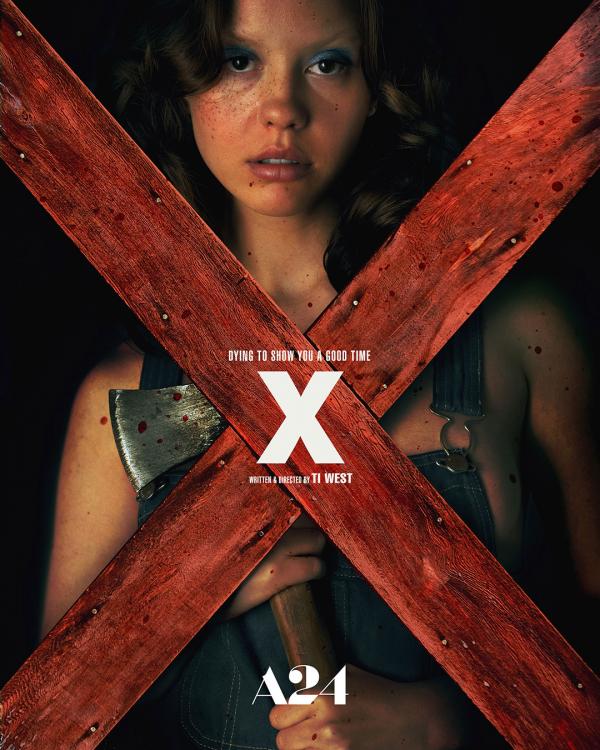Ti West’s X: A Critical Review

Warning: this review contains spoilers
There are seldom things more ‘70’s than a group of young friends, clad in cowboy boots and flares, embarking on a road trip seemingly in the middle of nowhere in rural Texas to film an adult movie. Directed, written, and produced by Ti West, X is set in 1979, paying homage to the slasher films of the 1970’s; the decade’s nostalgic charm being admittedly, exactly what prompted me to buy my pass for the movie within minutes of reading about it last week, as well as the fact that slasher movies have become increasingly unpopular and I was eager to see what a modern day interpretation of the classic slasher films would look like.
It’s no secret that the horror films of the past are riddled with misogynistic stereotypes, and unfortunately X reveals itself as not being totally exempt from that. With a textbook plot there of course comes its textbook characters: the blonde Bobby-Lynne (Brittany Snow), the brunette friend Maxine (Mia Goth), the Black friend Jackson (Kid Cudi), the “pure girl” Lorraine (Jenna Ortega) and a more contemporary archetype I would be okay seeing more of, the-film-bro-who-believes-his-porno-is-art-caricature, RJ (Owen Campbell). West juxtaposes the young characters with the two eerie elderlies: Howard (Stephen Ure) and Pearl (also played by Mia Goth) who own the farmhouse the younglings film at.
All is dandy until Lorraine decides she also wants to star in the adult movie alongside Maxine and Bobby-Lynne, causing frustrations with RJ whose Madonna-whore complex is at an all-time high with claims along the lines of her not being “dirty like those other girls”. After Lorraine partakes, RJ’s character wakes up in the middle of the night for the textbook cleansing shower scene, instead of Lorraine. This is where X appears at first to be promising in terms of subversion, as it would usually be the pure girl doing so. Still in his hissy fit, RJ decides to take the car and abandon them in retaliation but like an apparition in the headlights, Pearl appears and halts his endeavour. Having spied on the young crew having sex knowing full well she hasn’t been able to have that connection with her husband in years on account of her old age, she imposes herself on RJ. He rejects her because of her undesirability, and she bludgeons the film bro to his death. It’s at this point in the movie where the audience is inclined to think that perhaps the elderly woman is the real victim all along, and the real antagonist is the beauty standards established by the male gaze that prioritizes youthful, beautiful women; seems like a real neat theme for a feminist horror movie.
Despite Pearl’s killing spree, the audience even begins to sympathize with her, seeing how she’s been reduced and ousted to such a great insignificance due to her old age. Except, that in the end, West fails her character arc when Pearl is pitted against Maxine—the Final Girl who she puts on a pedestal because she’s the brunette friend and therefore “seems different”. Though I’ll hand it to West, for (whether intentionally or not) subverting the stereotype of the Final Girl as Maxine, who openly wants to be the star of the raunchy film is the Final Girl; whereas horror films are notorious for wanting to make a statement with the pure girl as the last one standing.
It’s also no secret that horror films of the past are ridden with racist stereotypes. Cudi’s character happens to be the only Black friend among the crew. Even in this tribute, Jackson is only limited to being the static, supporting character to their white friends. One would hope that for a chance to rectify these racist stereotypes, seeing as it is 2022, West would’ve taken the opportunity to subvert them. And although Jackson isn’t the first to die, he dies when the old, white man shoots him right after he fulfills being the “mythical Black man''—the stereotypical Black character who guides the white dude (think Dick Hallorann in The Shining). Moreover, most of Jackson’s scenes are of him being subjected to the stereotype of the lustful, hypersexualized Black fiend that screws the white woman—actually, women, in this movie.
Despite the unnecessary stereotypes, and to end this review on a lighter note, X uses the conflict of the older generation vs the younger generation and shines it under a refreshing light that is to be appreciated. At times, old age seems to be the real horror of the movie as it’s depicted as isolating and devoid of connection. Pearl wants to feel relevant and of course she is the one who is seen suffering at the short end of the stick in comparison to her husband- paralleling how women suffer the most in contrast to men at the hands of society as they age, due to rigid beauty standards that demonize those that don’t fit within them. West even includes a scene that’s both poignant and shocking at the same time: Howard and Pearl having sex despite the potential risks of heart attack that later brings Howard to his demise—something that I’m sure most of us have never seen from a medium that primarily lures its audience in through its eye candy cast.
If you’re easily allured by escapist nostalgia and horror, then X is a film you’ll enjoy. If you’re someone who anticipates the horror genre ridding itself of harmful stereotypes, then X is a film you most likely won’t enjoy.




